|
| 2016 | JAN | FEB | MAR | APR | MAY | JUNE | JULY | AUG | SEP | OCT | NOV | DEC |
| 2017 | JAN | FEB | MAR | APR | MAY | JUNE | JULY | AUG | SEP | OCT | NOV | DEC |
| 2018 | JAN | FEB | MAR | APR | MAY | JUNE | JULY | AUG | SEP | OCT | NOV | DEC |
| 2019 | JAN | FEB | MAR | APR | MAY | JUNE | JULY | AUG | SEP | OCT | NOV | DEC |
| 2020 | JAN | FEB | MAR | APR | MAY | JUNE | JULY | AUG | SEP | OCT | NOV | DEC |
| 2021 | JAN | FEB | MAR | APR | MAY | JUNE | JULY | AUG | SEP | OCT | NOV | DEC |
| 2022 | JAN | FEB | MAR | APR | MAY | JUNE | JULY | AUG | SEP | OCT | NOV | DEC |
| 2023 | JAN | FEB | MAR | APR | MAY | JUNE | JULY | AUG | SEP | OCT | NOV | DEC |
| 2024 | JAN | FEB | MAR | APR | MAY | JUNE | JULY | AUG | SEP | OCT | NOV | DEC |
![]() Read current month's Daily Reflections
Read current month's Daily Reflections
![]() Table of Contents: Daily Reflections
Table of Contents: Daily Reflections
![]() Youtube Channel: Video Listing
Youtube Channel: Video Listing
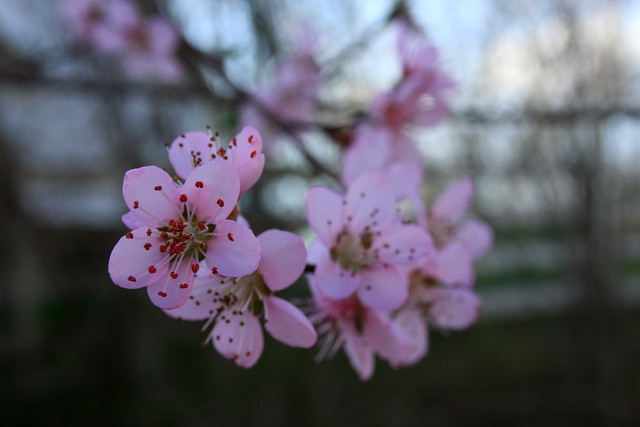
(Photo: Janet Kalisz)
Reflections April 2024
April is a month of contrasts: Following March's stark promise of new life, April brings forth a dramatic transformation of the woodlands from nakedness to nearly full greenery by May first. It is the metamorphosis from winter's cocoon to springtime's butterflies. In our Northern Temperate Zone we endure the late frosts; then nature's scents of last year's leaf decomposition give way to the fragrant aroma of wildflowers. Our spiritual outlook is colored by the changing landscape of the Easter season after the pains of Holy Week. We truly believe that Earth can be healed and restored and we are party to this renewal.
Cherry Blossoms A burst of floral sunlight |

New buds of dwarf larkspur, Delphinium tricorne.
(*photo credit)
April 1, 2024 Taking Easter Time Seriously
For our sake he was crucified under Pontius Pilate; he suffered, died, and was buried.
The Nicene Creed
Recent Popes have sought global Christian consensus to change Easter to a fixed date in mid-April. There has been a long and contentious church historical record on when to determine Easter so that the entire Christian world celebrate it on the same date. To keep to Easter in the Passover tradition means that this should be the first Sunday after the first full moon of the Vernal or Spring Equinox. Practices go far back and when the Orthodox world refuses to accept the Gregorian calendar it means that many times Easter is a full month later in that tradition due to the two-week lag time in retaining the Julian calendar. Jewish Passover and Western Easter often coincide.
This week includes an emotional roller coaster ride from Palm Sunday through the early part of the week and then to Holy Thursday, through Good Friday and Holy Saturday, and to Easter. For believers, much time is reserved for the liturgy celebrated and the reflections associated with others in the community. This goes beyond the winter's fullness of creative mystery. It includes the damage to human communities and to our planet through individual and corporate misdeeds. We turn to Jesus, the perfect person for redemption and ecological balance, whose ministry as healer, teacher, and activist is a template for our own activities.
For the next few days we enter into Jesus' suffering and death -- the first portion of the paschal mysteries. Then we follow and treat the Resurrection event, noting that our own suffering and death in Christ give way to new life. Hope colors the passing of the old order; it stands in stark contrast to the non-believers' view of the confusion of mortal life and often for their expected oblivion. We renew our life by passing through real suffering, but with an eternal destiny; non-believers see decomposition as finality; we believe firmly in a metamorphosis to eternal life.
Believers assert that God's saving plan is accomplished through the death of Jesus; through faith we examine the circumstances of Jesus' death, faithfully handed on by the Gospels and illuminated by other sacred sources, the better to understand the meaning of the "Redemption" (Reference: Catechism of the Catholic Church, # 573). Let's look into the redemptive act, confident that by expanding suffering to a wounded planet we discover our place in the salvation process. We move closer to the humble Jesus, the meek lamb who is led to the slaughter. All four Gospels give accounts of the passion, death, and resurrection of Christ, according to the perspective of each evangelist.

Delicate yellow violet in Kentucky woodland.
(*photo credit)
April 2, 2024 Liberating through Our Efforts
We are liberated in Christ and we participate in the ongoing liberating act in freeing people to live a higher quality of life. Thus our theology is worthy of consideration, especially in these troubled times.
Gustavo Gutierrez, the father of Liberation Theology says that there is not the juxtaposition of a profane and a sacred history, but one single destiny assumed by Christ, the Lord of history (Reference: Essential Writings, Maryknoll, New York: Orbis Press, 1996, p. 79). He continues that the history of salvation is at the heart of human history and that the salvific action of God underlies human existence. God's love for human beings in their plight takes the form of a promised Messiah, one sent to save the human race, one like us in every way but sin. This Messiah expresses God's love in personal form, for all of God's love is personal. Begotten from all eternity, the Son of God lives and moves among us -- God/man. In due time and in a promised place, the Word comes to reveal the fullness of God's love. The Word is God's perfect gift, the divine self-communication, God manifested in the person of Jesus.
Today, research uncovers for us details about long lost ancestors and close and distant relatives. Calendars and clocks give exact dates and times of occurrences. We can carbon-date objects to within a relatively short span. Geographical Positioning Systems (GPS) give exact spacial positions to within three feet, although identifying these positions formerly involved calculation with far less precision. Both times and places are ascertained with greater certainty. These give us a clearer picture of past events, historic places, and thus the possibility of a heightened awareness of history. The age of the Universe and the Earth herself are now measured with relatively improved accuracy to so many billions or millions of years; the advent of human beings is determined in tens and hundreds of thousands of years. With such measurements we speak about the Coming of Christ as an event two thousand years ago and "the last of the ages," a relatively short span in the total geologic age of the universe.
Through that growth in historic consciousness we begin to appreciate the long period of time that went into God's preparation for the coming of the Incarnate Word. A unity of pre-history and history brings creation and salvation into one grand act. Gutierrez argues from Old Testament texts that various passages in Isaiah and elsewhere refer simultaneously to two events: creation and liberation from Egypt. Thus he considers these as one salvific act (Reference: Essential Writings, p. 81). Certainly the process includes a chosen time in a chosen place, the Holy Land. Creation and liberation are found in Jesus "through whom all things are made" and through him all things are to be freed.
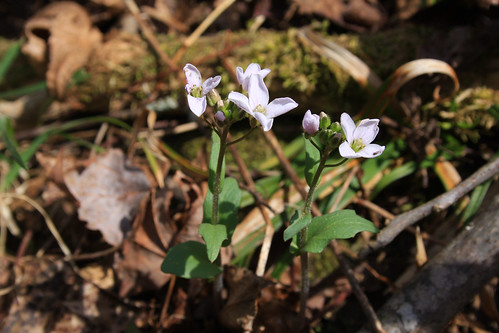
Purple cress, Cardamine douglassii, edible native Kentucky wildflower.
(*photo credit)
April 3, 2024 Finding Jesus Among the Poor
In this month of March we ask ever more deeply who is this Jesus who we seek to imitate? It is a Lenten question as we puzzle all the more in trying to discover our role in life, knowing all the while how little we can do as individuals in service.
We may find some answers in the learned towers of academia, but maybe we stumble on the grassroots where God's presence is seen if we but look down. Radiance comes from the illuminating cases of the poor and simple as much as from the academic towers shining forth in our world. Christ is found in a humble manger of hay far more quickly than on library shelves. A world that forgets love finds love personified among those who struggle to feed a growing family or must have lodging as homeless refugees. Christ came at the grassroots; in Earth's cave we identify with the poor Jesus.
Bonaventure, Francis' biographer, tells us that hay, which is the mattress in the manger, proves a cure when eaten by sick people and animals. The night becomes as day; the woods with the crowds ring out as did the rocks in jubilation (Reference: Maria Jaoudi, Christian & Islamic Spirituality,: Sharing a Journey, Paulist Press, p. 82). Simple stories of simple folks tell us who Jesus is as much as learned books.
For the most part we are descendants of people of faith. They believed in the future to such a degree that they bore and nurtured children, and yet for most of us, our recorded ancestry is a few generations of names and dates. We honor the graves of ancestors; we remember them in our celebrations; we hold their photos in revered places. To look back occasionally, though not walk backward lest we stumble, is a way to get our perspective on life's journey. The story does not end in a cave in Bethlehem, or in the flight into Egypt, or the hidden life. We are going to the light -- to the creation of a New Heaven and New Earth.
For us, as for Jesus of the House of David, our journey of faith starts with our ancestors who nurtured us in faith and trust. Likewise, we look ahead to a hope-filled horizon at an eternal home. Our "present moment" is built on love, and this virtue alone will endure when faith and hope fade away. To be truly present in the current struggles we look to the courage of others who have had to struggle and yet hold their faith.
The "poor" may enter our lives by distant observation so that knowing their presence is a means to basic salvation, "Did you see me when I was hungry?" That first level of seeing is exceeded through voluntarily assistance to those who lack essentials -- and this can be the beginning of more perfect humility. In so doing we acquire a deepening identity with the poor in our own lives and then we can reach the deepest level of discovery that we are poor and in need of God's grace. Through this final level of identifying with the poor we are empowered to act in godly ways.
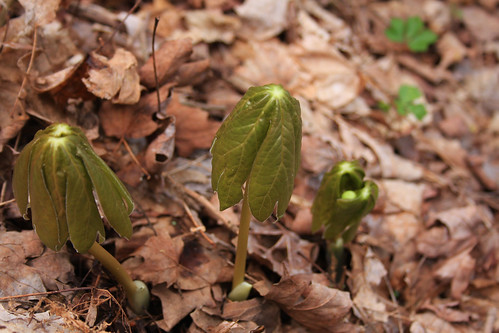
New emergence of the mayapple, Podophyllum peltatum.
(*photo credit)
April 4, 2024 Stepping Back for a Moment
"They took the body of Jesus and wrapped it with the spices in linen
cloths, following the Jewish burial custom." (John 19, 40)
We all need time in our lives when we step back and, as Archbishop Romero allegedly says, "Take a long look at things." We sometimes are closely involved with the living Calvary all around us. If we venture too deeply, we risk burning out. We sometimes need to take a break and rest up for the inevitable future struggles, which will surely come. We need to step back and fall into the hands of the Divine Source of Life.
How do we, the living, go to Calvary and follow Jesus to the tomb and beyond? Certainly, we realize that dying people come close to Jesus by their free choices. But what about those in good health? Should we do more than encourage a dying relative or friend? Norman Cousins says, "The tragedy of life is not death, but what we let die inside us while we live." When we clutch what we can't ultimately hold on to, we allow selfishness to stifle the generosity of life -- and we slowly die over time from within.
Thus, at any stage of life we can have our own mini-Calvary, where we resolve to begin to let go freely and openly of what is most cherished. If a young person can let go of what is so good, that person is free to follow Jesus wherever he or she is led. All too often we teach youth to reach for, possess, and cling to material goods, not to cherish letting them go. We fail to remind them that life is letting go, and that in all stages we become all the more by letting go more and more generously and thankfully. We need to prepare for our ultimate material nakedness, clothed only in our love, when passing to eternal life.
When we get older or desirous of a change of pace, we are tempted to let go of even our most choice possessions: our hideaways, our souvenirs, our titles and awards, our favorite dishes, our driving privileges. Really our life is the act of letting go of the liveliness of infancy and youth, and we gradually give up the routines, jokes, hang-outs, and haunts we found entertaining at an earlier time. Freely letting go when not required to by health, economic necessity, or death shows that we have the grace to give up what we cherish most. It takes a deep spirituality to give up without regret, for that is what Mary does in releasing Jesus to public life, to derision, to taunts, and now to the tomb. We let go of loved ones at funerals and cherish memories, which somehow start to fade after the last "good bye."
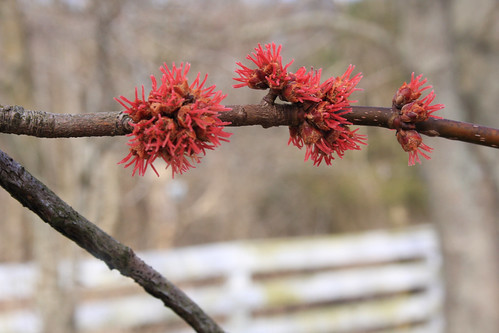
Blossoms of the silver maple, Acer saccharum.
(*photo credit)
April 5, 2024 Immersing in Local Environmental Issues
I have worked on curbing and regulating off-road vehicles (ORVs) since 1990, but not with great success. The problem is that only a portion of those engaged in this pastime do environmental degradation (soil erosion, noise pollution, water quality damage in creekbeds, and wildlife disturbance); these are irresponsible ORV operators who drive recklessly. Behind the scenes are domestic and foreign ORV manufacturers who pressure people into buying these expensive and highly damaging vehicles. Promoters paint a picture of the ultimate nature experience. Careless riders in an outdoor experience can assault fragile territory in areas with low police enforcement. ORVs have a poor safety record with over 40% of deaths being among youth. We fight against enormous financial pressures with only limited success.
In springtime, activism takes on new life. The range of environmental tasks is formidable: trail maintenance, river and creek cleanup, litter pickup, clearance of exotic invasive species, tree planting, and forest and wildscape management. The soon-to-be foliaged landscape beckons volunteers who want to get some early spring outdoors experience. March characteristic actions include freedom, respect, simplicity, endurance, and rootedness:
* Choose an issue freely and well. Do what comes easily for you through direct observation and monitoring. Feel strongly about the issue and realize other helping hands are few. Recognize needed talents and resources. Accept support, be humble and beg for help from others. Recruit support when possible.
* Respect your own resources. An issue that seems quite limited to a highly energetic person may be just right for an older or physically-challenged individual. Grade contributions with care because of the actual limits on the activist's own time, finances, talent, and energy. Work within your own limitations.
* Simply accept that risks are involved. Environmental activism is a public commitment. We need to curb our overly emotional stances. If activism involves a specific business or touches the profits of special interest groups, be prepared for negative feedback or undercutting of one's credibility. Simply put, keep a good sense of decency, charity, and openness.
* Green matter is often gray. We may not have the full story and so must be open to misinterpretation and some wrong facts. Double check references and leads; don't go too fast. Don't expect completed work in a short time. Often it takes years to curb environmental degradation. Endurance brings on success.
* Act locally within grassroots groups. Being rooted in our communities allows us to see problem areas that have local significance. Broader issues may seem enticing, but healers must most often begin near home and with recognized friendly faces
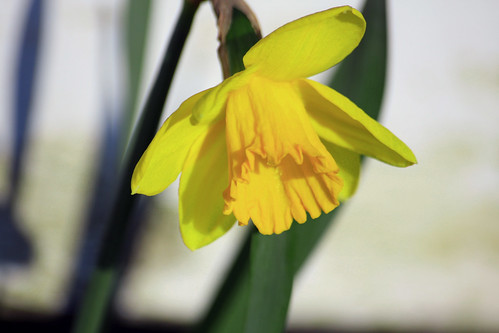
Daffodil of spring.
(*photo credit)
April 6, 2024 Showing Mercy/Justice by Climate Change Funding
The faithful all lived together and owned everything in common. (Acts 2:44)
Our global welfare is a basic commons. However, some affluent lands have caused greater climate change ill effects and ought to be the ones contributing more to remedial efforts, especially since the toll will be more unequally shared by poor folks who still lack electricity and basic amenities of life. In the past quarter of a century all Climate Change and United Nation's Environmental Conferences have had these points eloquently stated by numerous developing nations, including Pacific Island submerging nations. An injustice exists; justice now needs to be served to the poorer lands that will bear the brunt of affluent extravagance.
Funding to introduce conservation saving techniques, protection for farmers, water distribution systems, renewable energy projects, and pollution control devices on fossil fuel emitting projects could mount to hundreds of billions or even up to a trillion dollars. The case is a just and merciful one, but really is a bone of contention at these meetings of rich and poor lands. However, these challenging funding numbers are about as accurate as estimates can be for control methods, but money given to such funding is currently paltry, and simply ignored by most affluent nations with their own funding problems.
Climate change will have effects such as submerged regions that will affect the urban and rural poor more than others who can escape to shrinking favorable zones. The poor will endure the brunt of unsafe drinking water, foul air, littered landscape, proximity to hazardous waste dumps, and lost jobs through destruction of forests and erosion of land. According to the United Nations Environmental Program, 4.5 billion hectares or 35% of Earth's land surface is threatened with desertification. The rural population (mostly the very poor) affected by serious desertification increased from 57 million in 1977 to 135 million a mere seven years later. That number has grown still more in the ensuing years, though not by such immense amounts. The rural poor are climatically, geographically, and economically disadvantaged.
One additional fact is emerging: don't rely on the affluent to change the world; it must come from the bottom up. There are fewer and fewer "sugar daddies." Only in recent years have strong voices sounded from non-affluent developing countries -- a change evident at the Rio Environmental Conference in June, 1992. Obviously, those holding key environmental positions are from white male elite organizations. Wealthier folks often fail to recognize either the deep sense of helplessness experienced by the poor, or their own inherent powerlessness, which may lead to a new global solidarity.
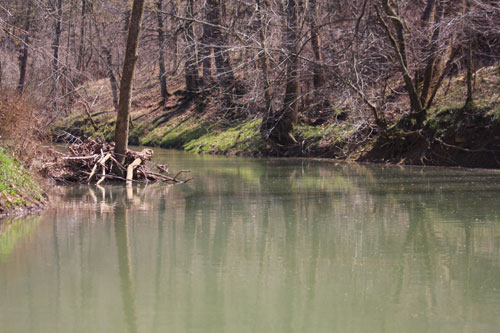
Greening at streamside.
(*photo credit)
April 7, 2024 Calling Us All to Mercy Sunday
The whole group of believers were united, heart and soul; no one claimed for his own use anything that he had, as everything they owned was held in common. The apostles continued to testify to the resurrection of the Lord Jesus with great power, and they were all given great respect. None of their members were ever in want, as all those who owned land or houses would sell them, and bring the money from them, to present it to the apostles; it was distributed to any members who might be in need. (Acts 4:32-35)
The beginnings of the early Church gives us an example of what we now call the entire world to do, namely, to share the commons with each other and especially those in greater need. The early community was engaged in radical sharing, deep respect, and profound sensitivity to the needs of others. An early condition of Christian charity/justice did not last, perhaps due to the trauma of the fall of Jerusalem to the Romans, but it is not something that is forgotten. We have within our hearts a resolve to never forget and to attempt to bring it back on a broader level of global dimensions; this is a growing demand for "spiritual globalization."
The struggle of people for the essentials of life is a calling that is clear to us all as Easter people. The destitute and very poor are about two billion of the planet's seven billion people, with the gulf between super-rich and poor widening before our eyes. What better time to address this than on Mercy Sunday? First of all the inequality is greater in certain countries, among states, and within regions; in all cases this leads to a host of difficulties within the area. See a convincing book: R. Wilkinson and K. Pickett, The Spirit Level: Why Greater Equality Makes Societies Stronger, (Bloomsbury Press, 2010).
We look to the merciful Jesus who chooses to be poor. Jesus humbles himself, is born in a stable/cave, has humble parentage, is presented in the Temple by a gift of turtle doves, becomes a refugee at early age, lives in remote Galilee engaged in a humble occupation, chooses humble working people for disciples, and moves among the infirm and restless crowds with pity and compassion. He defends the poor against the establishment, is condemned, suffers, dies in the most ignominious of circumstances, and is quickly buried without fanfare. Jesus identifies himself with the little ones and the wretched (Matt. 25:45).
Poverty goes hand in hand with the spiritual childhood required to enter the Kingdom (Mark 9:33). In Luke's view Jesus has in mind for his disciples actual radical sharing (Luke 12:33) (sell your possessions and give alms). The spirit of the Easter season is new life and this is to occur through the poor.
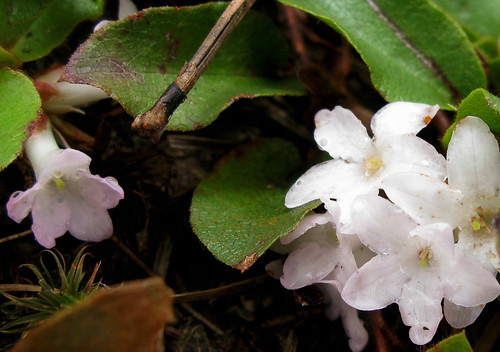
Sweet-scented trailing srbutus, in bloom.
(*Photo by Sandy Richard, Creative Commons)
April 8, 2024 Mystifying Aromas of Spring
Awake, north wind,
Come, wind of the south!
Breathe over my garden,
to spread its sweet smell around.
(The Song of Songs 4:16a)
I like the aromas of every month, but April's are a blend so hard to describe and yet so vivid to the senses -- floral, animal manure, composted matter, first pollen-laden air. These trigger a bittersweet sensation, for the harshness of winter still lingers and yet the gentle awakening earth is coming to life. Spring odors bring back to me specific farm fields I knew so well seven some decades ago. We are marked by our past and aromas are very pronounced among our sensations. They take us back in time and arrive welcoming or dreaded depending on earlier circumstances.
Some substances that "smell bad" in intensity become perfumes in diluted fashion -- though some people may even find these obnoxious. It is hard to expect that from a pole cat/skunk, but the phenomenon does apply to many natural scents. Springtime, with its warming of the soil, triggers the composting of the leaves and organic matter of the previous year in an accelerated manner -- and we call the aroma spring's "freshness." April's breezes blow across newly-turned sod. Where allowed, this is time to burn dead branches and briars resulting in an unforgettable scent of the season. Also drying humus has an aroma; so do rotting leaves and the manures and compost we apply to plots. Add to this the spring vegetation of wild garlic along with daffodils and violets waving in the warm air, each plant contributing to spring's full scent.
Appalachia and other places in a world of material goods, castaways, and empty pop bottles show our lack of control over excess materials. Each throwaway bears a label stamped "$500 fine if caught," but who is caught in a land of thin policing? With spring thawing, the dank smell of garbage, thrown carelessly when no one is looking, reminds us that care is in short supply -- and this extends beyond the region and involves national callousness. I recall a train trip from NYC to DC where some European tourists in front of me kept pointing out the window; when I looked, I saw nothing but discards all along the track. This was sightseeing!
Natural aromas compete with those made by human carelessness, some quite weak and some quite strong. The nose knows. We need to take the whiff of good and enjoy, and with the remainder strike a resolve to make our environment a better place for all. That cannot be done by each of us alone; we must work in a community in trust and make a difference as a responsible citizenry.
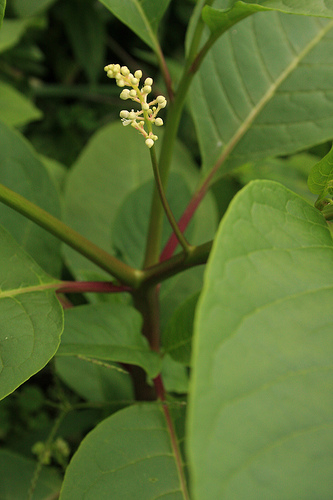
American "poke" or "pokeweed," Phytolacca americana.
(*photo credit)
April 9, 2024 Relishing Bittersweet Greens and Memories
You will eat what your hands have worked for,
happiness and prosperity will be yours.
Your wife: a fruitful vine
on the inner walls of your house.
Your children: round your table
like shoots round an olive tree. (Psalm 128:2‑3)
I await the poke plant's first shoots in late April. This poke plant will by late summer be tall and red with luscious- looking berries; one swallowed frozen every day deadens arthritic pains. In spring, we make poke "sallat" much like asparagus shoots with its similar texture, though with a slightly bitter taste unless we soak sprigs twice in boiling water. The leaves are an excellent spinach substitute.
The tastes of April vary from the bitter agonized suffering of those enduring Calvary to the sweetness of Easter joy. In fact, spring ushers in a variety of tastes, some pleasant and some not so. The tastes of pain are bittersweet, but they are soon to pass. We face bitterness as a short-lived experience, much as the bitter herbs of last week's Passover.
April's tastes bring back youthful memories of folks who experienced the Civil War. Our nearby neighbor, elderly Joe Davis regaled us youth with tales from that era when he was a boy -- making my memory of first-hand stories from that era a rare one in this country (though 35 children of Civil War soldiers still live). In the 1860s, a nation experienced either utter defeat or total victory, from Lincoln's time through Reconstruction. Soldiers on both sides, who survived winter camp diseases and bloody campaigns of summer, knew that spring greens were a nutritious alternative to bland military rations of salt pork, beans, and poached corn. They recalled their mothers gathering spring greens for family meals; these soldiers would risk leaving trenches even with occasional enemy fire to gather dandelions, lambs quarters, and plantain.
Now, we old folks continue to venture forth from secure places to risk bending down and gathering spring greens. We straighten up a moment and remember the past when we accompanied our elders, and gathering greens came far easier. Our minds venture back beyond the times of neighbors' tales to the Passover, the risk of going from slavery to a Promise Land. Our minds focus for a brief moment on this season when Jesus endured the bitter agony of his passion and death. The taste is bittersweet. Then when greens are well prepared we pass over quickly to the satisfying taste of a "mess of greens" packed with nutrition and so welcomed in the very trying conditions of a winter just completed. Tastes announce Good News!
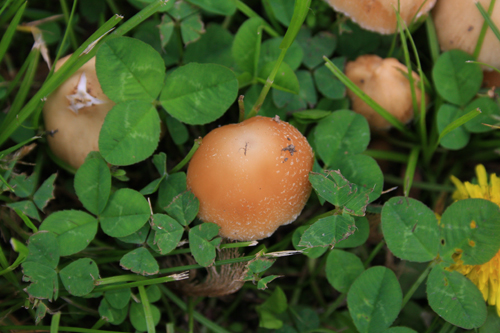
A natural spring bouquet.
(*photo credit)
April 10, 2024 Basking in the Spring Sun
Pride of the heights, shining vault,
so, in a glorious spectacle, the sky appears.
The sun, as he emerges, proclaims (radiates heat)
at his rising,
'A thing of wonder is the work of the Most High!'
(Ecclesiasticus 43:1-2)
The last frost and the first sunburn seem to almost overlap. We knew the second only too soon, but the first could only be known for certain as the month progresses; yes, there are unexpected late frosts. In simpler times folks would ask, "Does the sun gather strength as it arches higher and higher in the spring sky?" Or as we learn in general science, does Earth move and tilt in relation to the sun, thus furnishing our temperate zone the warming effects we attribute to the sun's own movements? We still speak of sunrises and sunsets even when we know better, but the world of common sense seems so much more comforting. April's sun still rises, appears in glory, and strengthens; and we avoid sunburn.
As St. Francis says, the sun is our brother and a friend who we welcome with its warming rays in springtime. Well, that fiery orb is always hot, but Earth's tilt gives it more glancing or direct contact. In a rather common sense manner of speaking we welcome the warming rays of sunlight on the lengthening spring days -- and the welcome is truly a reality. We are like moths drawn to light. The sun's rays help activate Vitamin D and energize our sluggish nature for performing the impending spring work. We realize that the sown seeds are swelling, sprouting, and starting to grow in the sun's warmth and lengthening days -- making this year's food crop. Summer and winter wanes.
Lengthening days remind us that Christ is the light of the World, and that we are called to be "light" in three ways: we serve as beacons and models for others, and with a certain equanimity we guide them on their journey of faith through troubling times; we illuminate the spiritual void in people's lives through a compassionate warmth that allows victims to find meaning in their own personal mystery of suffering; and we show that our community of faith is energized in its own "photosynthetic process" by the suffering and death of Christ. Darkness lingers, but darkness is being conquered by the strengthening April sun, and we can be the messengers bearing the warming rays of spring. Living with the waxing and waning of heavenly bodies sets up within us a rhythm wherein we live in harmony with nature. We are more familiar with moon phases, but it is seasonal adjustments with the sun that gives us moods often difficult to detect. Our spiritual ways are quite often in harmony with heavenly bodies making us more environmentally aware.
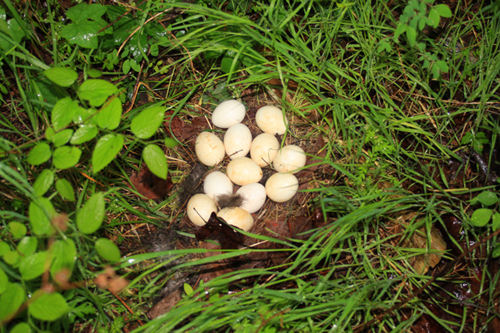
A clutch of turkey eggs.
(*photo credit)
April 11, 2024 Turning Fear to Joy before Our Eyes
O soil, do not be afraid;
be glad, rejoice,
for YHWH has done great things.
Beasts of the field, do not be afraid;
the pastures on the heath are green again,
the trees bear fruit,
vine and fig tree yield abundantly.
(Joel 2:21‑22)
Animals sometimes express fear. The neighbor's cat crouches in silence for fear that I may do it harm. The possum and pole cat attempt to cross the busy roads and so many do not make it. No wonder they are afraid when seeing the approaching traffic. It is the main killer of these small varmints, and yet we hardly reflect on such traumas all around. Animals fear what lies ahead, and yet they must take immense satisfaction when they cross the busy highway and are still alive. What joy from immediate danger!
Each spring brings a promise of fruitfulness and new life. We are future‑directed and thus we expect the plants and animals all about to thrive and be fruitful. Farmers put great hopes in the harvests they await from crops now being planted. In a similar way students anticipate the favorable results of their studies and their obtaining a degree. Workers want to satisfy customers and ultimately their managers as well. Those who seek employment hope the next prospect will prove hopeful; and a mother expects the fruit of her womb to be healthy.
Jesus tells us at Easter to "Fear not." "Open the locked doors to our souls!" "Let in the fresh air of hope!" Too often, we have streaks of fear and doubt of what may come in the near future. We fail to see that God's presence includes an ongoing promise, and that this applies not just to me, my family, my neighbors, but to all of creation around us -- and to our wounded planet as well. The sight of returning spring is the dawn of God's eternal promise of being with us always. And lives now immersed in turmoil will see better days ahead.
We have a special duty to those around us; we are to reduce their fears through our words of encouragement and support. Without really saying it, others want us to show strong courage in times when we could settle down to our own fears if we allow them to fester. But we are the Easter people; this means we are on the side of new life and dreams that can be realized if we but have faith. Things can get better and we need to affirm the Good News. The mood is realistic, not overly optimistic, and the realism rests with believers in the glory of the risen Lord. He is truly risen!
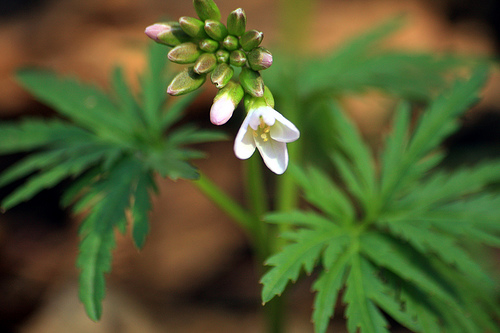
Cutleaf toothwort, Dentaria laciniata.
(*photo credit)
April 12, 2024 Listening to the Sounds of April Showers
Sing to YHWH in gratitude,
play the lyre for our God:
who covers the heavens with clouds
to provide the earth with rain,
to produce fresh grass on the hillsides
and the plants that are needed by us.
(Psalm 147:7-8)
Some sounds, such as that of spring showers on an overhead galvanized roof, are music to the ears. The rain says "stay put" while the distant rooster says "arise, there is spring work to be done." While working in Washington in the 1970s, I designed my jogging route to move about the National Memorials and Tidal Basin of the Capital. On a warm spring afternoon, with the first spring shower in weeks dampening my path, I passed that white marble Lincoln Memorial and could hear it sizzle. Yes, the acid rain in the stale polluted air was dissolving the calcium carbonate in the blocks a hundred or so feet away; and pollution's dirge could be plainly heard, the foreboding sound of the death of our memorials to the immortals. The sound brought back memories of a few years before when I accompanied a fellow Jesuit classicist, Ed Miller, as he was allowed a pass to enter the grounds for research on the Roman Colosseum. I tilted a rather smooth building stone strewn on the ground; the underneath side was finely chiseled as though the ancient carver had just worked yesterday; the side facing the acid rain was as though melted. Earth healers, arise! Even the stones cry out in pain.
Thank God for the showers of April that bring the flowers of May. The sound of such gentle raindrops on the window is invigorating. But do we thank God also that we hear the showers of acid rain and their telltale mischief? Maybe the sound is not as inviting, but it tells us to be compassionate for the pain in Mother Earth where even stones are in turmoil. She cries to heaven to be saved from human misdeeds. The sentinels of dawn stir us from slumber to arise and save our wounded planet. Perhaps the light patter of outdoor sounds may lull us back to sleep. April showers can be comforting, but these same rains can bring down devastation when polluted by human misdeeds.
Winter is past; spring calls forth new energy and new hopes. Now let's be on with the task ahead; let's protect the very shower-bearing clouds from acidic air pollutants. Fresh air is a commons that was meant for all to enjoy; it should not be allowed to be taken over by oppressors who think they can mine the commons and enclose them for their own purposes, while at the same time making a handsome profit off of what belongs to all the people. Gentle showers are reminders to us that our responsibilities lie beyond life and take care of gifts we are privileged to receive.

Kentucky native plant, star chickweed, Stellaria pubera.
(*photo credit)
April 13, 2024 Discovering Two Standards
At the beginning of this millennium I was asked to discuss, here at Oslo, the greatest challenge that the world faces. Among all the possible choices, I decided that the most serious and universal problem is the growing chasm between the richest and the poorest people on earth. Citizens of the ten wealthiest countries are now seventy-five times richer than those who live in the ten poorest ones, and the separation is increasing every year, not only between countries but within them. The result of this disparity are root causes of most of the world's unresolved problems, including starvation, illiteracy, environmental degradation, violent conflict, and unnecessary illness that range from Guinea worm to HIV/AIDS.
Jimmy Carter, Nobel Lecture, 2003
Jimmy Carter is not alone in thinking that the big challenge and threat facing the world is the gap of wealth (and health) that separates rich and poor. David S. Landes in The Wealth and Poverty of Nations (New York: W.W. Norton, 1998, p. xx) calls this gap "the greatest single problem and danger facing the world of the Third Millennium." This observation has been repeated numerous times.
In Ignatian terms, we can imagine an immense battle being waged for the minds and hearts of people. Ignatius of Loyola puts this in terms of a struggle between the Standard of Satan and the Standard of Christ-- the personification of evil and our God. Ignatius says Imagine you see the chief of all the enemy in the vast plain about Babylon, seated on a great throne of fire and smoke, his appearance inspiring horror and terror. For the second part of the imagined scene Ignatius says, Consider Christ our Lord, standing in a lowly place in a great plain about the region of Jerusalem, His appearance beautiful and attractive. (Reference: The Spiritual Exercises of St. Ignatius, Louis J. Puhl, S.J., Westminster, MD: Newman Press, 1954, pp. 60-61.)
The struggle of choosing what to do is very real, whether we see evil as personified or not. The one standard is certainly that of Christ, the perfect model of ecological concern. The other is certainly evil, to which we will give the name of "materialism" and includes the attitude that Earth and all in it be damned, for the believers of this standard live only for the day. The ascendancy of evil today rests in part on denial of the perceived existence of both God and Satan -- and materialists tend to deny they exist.
This battle of good and evil has taken on new dimensions since 9-11 and the rise of ISIS. This is NOT a clash between two cultures or an historic "crusade." Let's not place Moslems in one camp and Christians in another; there are haves and have-nots along with materialists in both camps. This is a battle, as John Kerry says, between civilization and barbarism.

A carpeting of spring wildflowers on the forest floor.
(*photo credit)
April 14, 2024 Rejecting the Standard of Materialism
He meant well in his own way. He was worth millions and was able to list the six figure donations made to all sorts of charitable causes -- actually quite good ones. In January 2013, Fred pleaded with me to do just two simple things and I could have all the money needed for our two poor parishes: say that the present economic system is the best in the world; and deny that climate change is caused by human beings. I rejected the offer.
On the one side are arrayed the forces of influence and wealth -- the "haves" (those of material affluence) of the world. They strive for wealth, honor, and power. They seek to ally themselves with multinational corporations, bankers, and those on the fast track of corporate control. These individuals and institutions can set their own agendas with their wealth; they choose who to assist and indirectly who does not get the largesse that they plan to distribute. They speak of free markets and free trade that works to their own advantage and of an economic globalization that only deepens the divide between the haves and have-nots. Their philosophy is a materialism that focuses on selfish interests, greed for more, and a determination of agendas, which are beyond democratic controls. The atheistic materialism of the Communistic era has been replaced by this equally godless materialism of the West, with enticements that seem so beneficial.
In their move to retain power, this group ignores another side that contains the poor, marginalized, forgotten, abandoned, small dirt farmers in India and China, the voiceless in the urban ghettos, the illiterate who spend much time hiding their inability to read, and slum dwellers in Sao Paulo with its twenty million inhabitants. These could be termed from Old Testament times, the Anawim, those for whom the prophets spoke and whom they defended. These are the folks who live on a dollar or, at most, on two dollars a day. They are almost invisible, certainly so to affluent folks, who do not look out and see the lowly at their doorsteps.
If we cannot see the poor, we are already in deep trouble. The basic urge is to take more time and effort to assist them than to define them. However, for those caught in the web of materialism, they cannot see beyond their possessions. They see those on food stamps as well-fed and that the indebted have enjoyed the fruits of others, including their own labors. Why force the ones who own to look beyond themselves when victims either do not exist or have the non-profit sector to care for them? The materialist says that the so-called "poor" have enough to live on, along with the license to waste and overspend. Most have modern conveniences such as electricity and running water and even minimum health care and public education opportunities.

Squirrel corn, Dicentra canadensis.
(*photo credit)
April 15, 2024 Choosing the Standard of Radical Sharing
If anyone wants to be first, he must make himself last of all and servant of all. (Mark 9:35b)
When leaving her home after sixty-seven years of married life and widowhood, and after raising a family and caring for a farm, my mother called her family and friends together and encouraged them to take what they wanted, saying` she was closing down her long-time homestead. She held nothing back; it was a great moment to watch her so happy in giving away her cherished keepsakes and household items. She was letting go, and it was a free choice.
In the time leading up to the Paschal Event, Mary (sister of Martha and Lazarus) pours precious nard (a perfume) on Jesus' feet and dries them with her hair (John 12:1-11). Judas objects that the valuable perfume could have been sold and proceeds given to the poor. Jesus responds, "You have the poor with you always, you will not always have me." This can be interpreted as whenever and wherever there are poor they are at God's side. The presence of the poor in our midst is a stark reminder that our task of healing involves redistribution of resources and closing the ever-widening chasm between the 5% who owns over half the possessions of this nation and acquire 90% of new wealth -- and the rest. Furthermore, while the poor are with us, we realize that all people rich and poor must have moments of joy and celebration -- and this takes ornamentals (perfume) as well as essentials (food
During this Pascal Season another standard waves in the air. It takes on different expressions depending on cultural stances, but it is quite attractive to the marginalized. Some fear the West's brand of materialism and resort to extreme forms of violence, giving those of the status quo their own good reasons for enhanced forms of military suppression. Dissatisfaction is bred by inequality and it grows in direct proportion to the continuation of unjust privileges of the wealthy few -- and some dissatisfied know the power of a monkey wrench to damage a complex System.
Social media allows all, but especially the poor, to comprehend that a great and non-permanent divide exists. With access to cell phones and TV the average have-nots can glance through the cracks what the affluent side is like. Partly it is the advertisement for material things that make differences accessible and envy a growing temptation: it is to be enjoyed and so seek to acquire it if you can. These have-nots aspire to a higher quality of life now supposedly enjoyed by the affluent. We are all becoming more aware of what some few have in health, educational, and recreational benefits. The challenge is how to make a non-violent but fair transition which gives benefits to all.
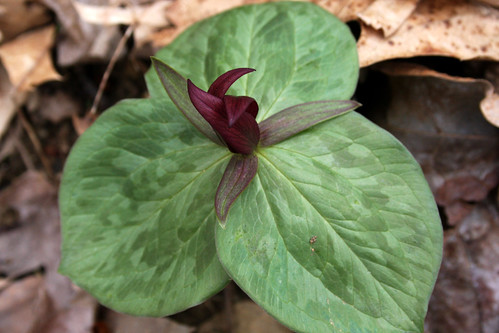
Trillium sessile. Woodford Co., KY.
(*photo credit)
April 16, 2024 Noting Difficulties in Decision-Making
Imagining biased standards -- Many find imagery of a dark "Satan" among classical choices to have a hint of racism, and so to personify evil with skin tone in mind really is quite telling. To portray evil or the wrong standard in religious terms (e.g., terroristic Moslem fundamentalist or right-wing militaristic Christian fundamentalist) can trigger free reign to biases. Even use of military terms can show a false approach if we are not discerning -- for the tranquility of non-action can be as false as the overly pugnacious. It tempts God by saying, "Let's slug it out," or "God is on the side of the winner."
Choosing imprecise spiritual standards -- The standards are not between terroristic Moslem and affluent Christian, but that of basic spiritual values of cooperation and collaboration versus the materialistic values of competitive devaluation, greed, and selfishness. Believers of many stripes fit under the true standard and those calling themselves "prosperity Christians" may be at the other. Do we side with a so-called "Christianity" that bolsters materialism allowing global warming and forgets about destruction of Earth herself? To help choose let's turn to the simple Jesus.
Sharing in limited ways -- We can supposedly share with all, but being human we need to direct our attention at given times. Some, especially within our communities, have greater need and being Christlike we move naturally to their need. That can be poor people or also include poor planet Earth.
Breaking violently -- All spiritually-directed movements must search deeply into their own traditions to find the non-violence that will allow them to be effective in this time of critical decision-making. We flee from the barbaric terrorism of ISIS and yet we know that at times a certain sacrifice of property, or "violence" by some interpretations, is justified. The Old Testament has numerous examples; even the New Testament cleansing of the Temple appears violent: Did every moneychanger get back all his coins? However, efforts are needed not to threaten human lives and even other creatures for the sake of a "greater good."
Focusing by the poor -- People who are hungry and homeless are quite focused on basics and not dominated by peripheral interests. This focusing has a certain purgative effect and allows the poor to see a situation with greater clarity -- even when their interest is narrowly personal. This focusing touches on the honesty so characteristic of Gandhi, whose answer to India's bondage was accepted by the poor -- "The English have not taken India, we have given it to them. They are not in India because of their strength but because we kept them." (Reference: M.K. Gandhi, Hind Swaraj 1939 [Ahmedabad, India).

Twinleaf, Jeffersonia diphylla, native Kentucky April wildflower.
(*photo credit)
April 17, 2024 Considering Basic Levels of Humility
If one of your brothers or one of your sisters is in need of clothes and has not enough food to live on, and one of you says to them, 'I wish you well; keep yourself warm and eat plenty,' without giving them these bare necessities of life, then what good is that? (James 2:15-16)
While reflecting on the choice of standards we can consider degrees of humble sharing in order to be closer to Jesus. In preparation to discussing three kinds of humility, Ignatius first directs us in the Spiritual Exercises (Puhl pp. 64-65) to three classes of people who have acquired a large sum of money: those seeking to do what is needed for salvation but the hour of death comes without so acting; those wishing to rid themselves of the attachment but in such a way that they retain what they have acquired; and, finally, those who want to rid themselves of the attachment, but wish to do so only through a grand act of indifference to what God inspires them to do. Let's presume that we as individuals or institutions want to be in the last class.
Degrees of humility. The word "humility" is derived from humus or the soil below our feet. An authentic eco-spirituality encourages human growth and development that is patterned after natural growth patterns through stages or levels going from elementary to advanced, each more all-encompassing and community-centered. Our growing compassion extends to all poor people and other creatures because we strive to take on the compassion of Jesus and to exercise deeper degrees of humility. We discover that even eco-spirituality admits ever-deeper levels of maturation.
First Degree of Humility: Tourism. Come and see. This degree is necessary for salvation. We must at least see the poor, lest we lose our souls, for we could be accountable for our insensitivities on Judgment Day. We must be able to see the suffering and respond. "For I was hungry and you never gave me food; I was thirsty and you never gave me anything to drink"(Matthew 25:42). However, this first level is hardly attained by people through tours to poor areas, where one sees the unfortunate needy, or through correspondence or reading about poverty. This purgative level of eco-spirituality requires more than mere knowledge of the poor, somewhat pharisaical, if the "eco-tourists" simply see the poor.
Charity. Come and Help. This is a certain advance over pure tourism and includes saving self and saving Earth with a mix of altruism and even fearful motivations. Fear includes loss of qualities of Earth's survival along with a sense of good will and donated help or resources. Good will makes an observer into a helper even if foreign, inexperienced, or possessing some service that could prove useful: monitoring, auditing, and rebuilding.
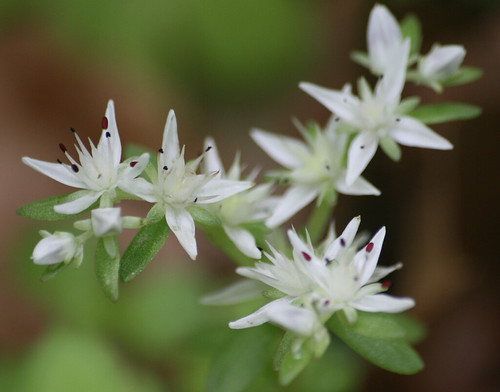
Stonecrop, Sedum ternatum.
(*photo credit)
April 18, 2024 Delving into Deeper Levels of Humility
Second Degree of Humility: Solidarity. Come and do or be with. This is the level of "pioneer" or "homesteader" who enters a poverty zone as "companion," who wishes to narrow the gap and be with the poor. These more perfect levels involve longer-term activities than periodic service projects. The Good Samaritan stops, binds wounds, puts the injured on his own beast, takes him to an inn, gives resources to assist in healing, and comes back and checks on progress over a span of time. Trappings of affluence are modified, and all parties become coequal; the sufferings of the poor are experienced on a first-hand basis by this companion. At this level, solidarity is cultivated as the poor person becomes a friend and associate, not a pupil or charity case. All parties look into the structures of a system that causes the poverty in the first place. This is the level of social justice, of research, study, dialogue, change of lifestyle, and involves renewing Earth.
Identification: Third Degree of Humility. Come and Be. This more perfect type of humility is an option after we attain the first two degrees and consists in our wanting to be more like Jesus, the perfect ecologist. If God can be better served, we seek to identify with the poor; we desire to choose poverty with Christ's poor rather than riches, honors, or power. "They, the poor" may exist on other levels but now it is "We the poor." This is the level of total detachment in order to be poor and to know we are poor. At this level we agree with St. Damien de Veuster, the apostle to lepers, by saying "We the poor." God may ask some healers to be illustrious medical researchers or to hold other honored positions -- but it is the desire to experience this final degree that is so important for the healing of our Earth.
In seeking to become more deeply involved as healers we must become vulnerable and suffer insecurities, such as loss of independence, status and, in some cases, life. Healers experience love through self-sacrifice and can identify with Jesus who in his suffering and death becomes profoundly one with the poor. Identification becomes an ennobling activity that goes beyond merely saving our Earth, or making life better for inhabitants, or even protecting fellow creatures. The pervasive and inclusive poor, the "We the poor," accept a relationship with all creatures for their (our collective) own sake, not for utilitarian purposes, and consider this a cooperative venture. We live simply eating and living as poor folks; we select social media and poverty of available resources, knowing that fullness of reclaiming the commons will come through the poor of which we opt to be one. Here an appropriate methodology becomes effective. Here the WE is as emphasized as poverty itself. The poor will rise!
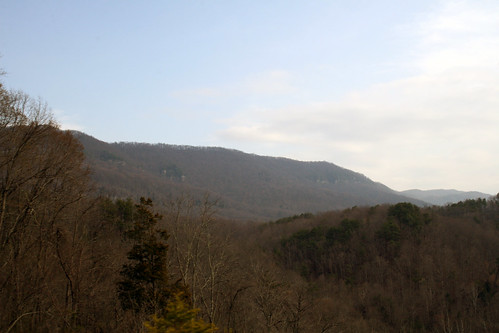
Early spring Appalachian view. Lee Co., VA.
(*photo credit)
April 19, 2024 Renewing Society: An Integral Economy/Ecology
Repent, therefore, and be converted that your sins may be wiped away. (Acts 3:19)
We commit to renewal through this Easter Season and a just social/economic order and a safe environment must be totally integrated. We expect economic justice to replace the inequality of our world and we launch a renewable energy economy to replace the fossil fuel one that is a major cause of threatening climate change. The status quo systems currently in effect must be opened to change so that profound renewal can occur. An integral economy/ecology is not based on merely tweaking the existing System, nor on extending the fossil fuel economy into an indefinite future. Renewal is emerging as a global hope and involves a real possibility though building on the good will and resources of the past. As Victor Hugo says, There is nothing so powerful as an idea whose times has come.
A number of steps to confront the status quo include:
* Fair taxation must be leveled on all, but with emphasis on corporations and the wealthy;
* Removal of privileges now given to the fossil fuel and nuclear power industries must be implemented on a global basis;
* International controls on banking and financing would move the world to local investments and remove large-scale tax havens;
* Enhanced collaboration in planning and actions must become a global issue among all people of good will with diverse skills and talents;
* Promotion of renewable energy sources as fast as possible, so that by mid-century it will be the total energy source and thus reduce environmental pollution ASAP;
* Maximum and minimum wage levels must become a reality so that equality can be achieved by a more just society;
* Recognizing the poor as the ultimate agents of change through more universal education and support of the democratic process would transform them from being objects of charity to essential components of an emerging just society; and
* Proclamation of the universal human right to health and livelihood is a keystone to a new social order. This means a global goal of ensuring citizens adequate access to health services and jobs.
The idea of justice for all is powerful, for it embraces the hopes of poor folks throughout the world. This is truly part of the Easter promise of God's kingdom coming in our world. To think or say that it can never happen must be overcome by the hope and action that makes it a reality worth working for. A growing sense of equality is a win/win situation for it improves the trust and security of all people. We are all our brothers' keepers.
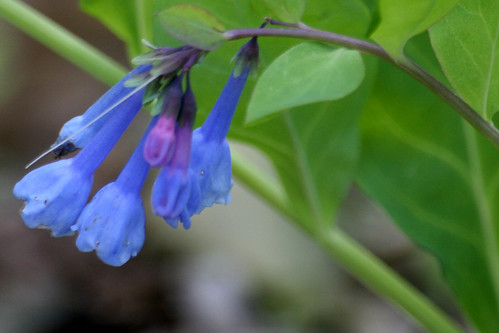
Virginia Bluebells, Mertensia virginica. Cedars of Lebanon, TN.
(*photo credit)
April 20, 2024 Joining Jesus as Solitary Witness
We found this man inciting our people to revolt, opposing payment of
the tribute to Caesar, and claiming to be Christ, a king. (Luke 23:2)
At various times in Jesus' life he stands as a solitary witness: the cleansing in the Temple, the challenges to his authority by the Pharisees; the moment he is condemned on Good Friday -- perhaps the most telling. The disciples are either far in the background or scattered. It is the times when Jesus is most alone and without companionship but still a solitary witness. When the cock crows, and Peter realizes that he is denying just when Jesus needs him most. The companions who promised to stand behind Jesus and walked proudly near him on Palm Sunday are now scattered at this moment of greatest need. Jesus is totally abandoned, and only his innocence accompanies him. The accusations ring throughout the courtyard in the early morning hours. He says he could destroy the Temple and rebuild it in three days. He considered himself equal to God.
The formal listing of accusations and the silence of Jesus is like a clash of cymbals with intermediate silence. It is the conduct of a Messiah whom the most creative fiction writer could not have dreamed up. At this most decisive moment in human history he is silent. "The messiah has come," is announced next to the Holy of Holies -- the center of religious life in the world--, and he is received with jeers by the authorities and bystanders present. A nation prepared for millennia to witness this moment does not know what it is experiencing; religious leaders are full of accusations; the aroused mob rejects the Messiah.
Should we be silent when the accusation deals with us, and should we speak strongly when the accusation is against others? That is what Jesus does. Then we ask whether Saint Paul follows that procedure when he appealed to Caesar as an individually accused Roman citizen and is sent to Rome to stand trial. Stephen, the first martyr, speaks boldly at the time of his stoning to death and even sounds provocative as a solitary witness. Accusations make us vulnerable and as in Jesus' case leads to great hostility.
How do we react in trying times? When we hear someone say a half truth or misinformation, do we think up a thousand ways of fighting back and reversing the accusation? We may fight back when others are falsely blamed or accused before the process of trial has begun, for they are presumed innocent until proven guilty. However, accusations and rumor can destroy a ministry without formal proof, for credibility and veracity are not always coextensive. This haunts believers who are aspiring witnesses.
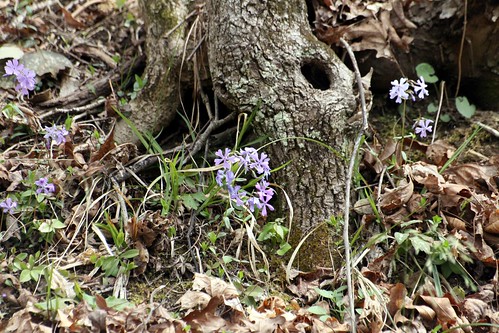
Phlox near the Mary E. Fritsch Nature Center, Appalachia - Science in the Public Interest.
(*photo credit)
April 21, 2024 Knowing Jesus as Compassionate
Come to me, all you who are weary and find life burdensome, and I will refresh you. Take my yoke upon your shoulders and learn from me, for I am gentle and humble of heart.
(Matthew 11:28-29)
The movie "The Passion of Christ" did not overly impress me. Jesus was made out to be a very hard guy, a Semitic Brave Heart; I doubted whether anyone could have endured the Latin-numbered strokes of scourging as delivered. It was somehow not in keeping that Jesus would strive to be the world's greatest "iron man." And I don't think he was, for he was far too humble for such a role. The vivid account of the passion in the movie had its good points, but what did not come through -- and I'm unsure whether it can be easily done -- is both the humility and the compassion of Jesus. That characteristic is too unique to be easily portrayed.
As followers of Christ we confront freedom of choice; now we ask the further question about freedom of specification, namely, what type of spiritual response will we give if we reject the "Satan" of materialism? Is our response one of a militant activism that punishes the materialist or chops heads off the infidel? Are we persuaded by a militaristic approach that seems so tempting to those who desire overwhelming authoritarian control? Are we willing to destroy with strapped-in explosives and seeking a gathering crowd, as an odd form of answer to modern materialism?
Our corrective answer rests in Jesus; we seek to imitate him and participate in his redemptive act. Just as Jesus suffers in each persecuted person as he says to Saul: I am Jesus and you are persecuting me (Acts 9:5), so Jesus suffers in the travails of all people on Earth. What about other Earthly creatures? Does Jesus not suffer with them? All things are created in and through him. We see our total offering as part of the radical sharing with others. God makes a covenant with all living things at the time of Noah (Genesis 9: 8-15). Jesus is the fulfillment of God's covenant with us (with Adam and Eve, with Noah, with Abraham and Sarah, with David); Jesus suffers and dies for all of us -- even the non-human.
For charity's sake we hesitate to ask others to bear our burdens; they have their own. However, as Christians we have a way out of this dilemma. Jesus forgives, is merciful, comes and gives us strength to face today's burdens, and while we are sinners he dies for us. An ever-deepening spirituality requires accepting the Lord's assistance, the sharing of a yoke as a team. "Look what they have done to my Earth." It is our Earth. Recognizing what becomes a cooperative venture lightens our spirits, for shared burdens are more easily borne. The self-emptying love of Jesus allows him to share our burdens; we share ours together.
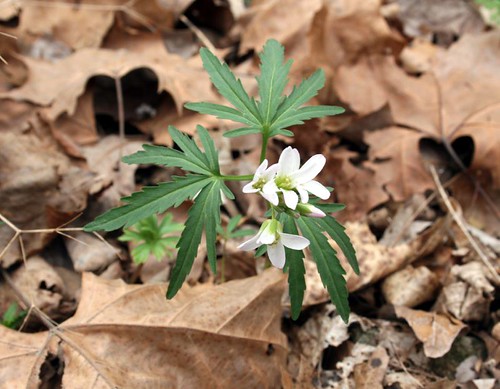
Dentaria laciniata. Red River Gorge, KY.
(*photo credit)
April 22, 2024 Seeing Jesus as Suffering Servant
Here is my servant whom I uphold, my chosen one in whom my soul delights. I have endowed him with my spirit that he may bring true justice to the nations.
(Isaiah 42:1; also 49: 1-6; 50: 4-10; and 52:13-53:12).
Back in 1978, I traveled a portion of the Appalachian Trail on a hiking tour as a way of making my annual retreat. The meditation during that hike from Damascus, Virginia, to Hot Springs, North Carolina, was heavily on the need to carry my cross. Exactly what does carrying a cross mean? The backpack said something about that as a telling burden. I never again made such an annual retreat, for backpacks are quite distracting burdens.
Jesus willingly makes his way with his reluctant disciples to Jerusalem, the hostile city, where the confrontation of forces is to occur. He goes freely as a person of spiritual power and with apparent successes in his public ministry to confront a situation where he will soon be totally powerless before seemingly powerful worldly forces. Jesus opens himself to being vulnerable, all in the service of love, for he is the servant par excellence. Recall that during Holy Week we have seen Jesus betrayed, condemned, subject to false witness, stripped, beaten almost beyond endurance, forced to be the substitute for a common criminal, mocked, crowned with thorns, and forced to carry a cross to the place of execution.
The "way of that cross" has been repeated by thousands of pilgrims in their faithful journeying along the traditional Jerusalem route, or at reproductions (Stations of the Cross) throughout the world. Today we can traverse in creative ways that original journey. Jesus accepts comfort from those weeping over his condition; he gets assistance to help carry the cross. He is accompanied by Mary, John, and holy women who stay through thick and thin even though it is barely more than as solitary witnesses.
"'My grace is enough for you; my power is at its best in weakness.' For it is when I am weak that I am strong." (II Corinthians 12:9, 10b)
At chosen times many of us are asked to suffer in some way. Then the question arises as to whether we are willing to carry on. Considering what is necessary on a trip is a worthwhile chore, for lugging unnecessary baggage is simply foolhardy when hiking. So is going under-supplied, especially if proper clothing is not included. In our life's journey we strive to relieve the backpack of guilt, blame, remorse, feelings of disturbance, anger, and words of discord -- to be left behind. Jesus is at our side and helps us carry our burdens along with those of others.

Bloodroot, Sanguinaria canadensis.
(*photo credit)
April 23, 2024 Walking the Stations of a Suffering Earth
Let's walk the road with Jesus amid our Suffering Earth:
1. Jesus is sentenced to die. Species on Earth are endangered or threatened with extinction due to general environmental pollution.
2. Jesus takes up his cross. People must bear the suffering of their water pollution, having no access to potable domestic water.
3. Jesus falls the first time. The understory is trampled upon and soils are allowed to erode for lack of cover in various forms of land pollution.
4. Jesus meets his mother. Chemical Pollution results in birth defects and crippling illnesses which confront poor families in polluted residential areas.
5. Simon of Cyrene helps with the cross. They do symbolic gestures by washing oil-soaked sea gulls in the polluted seaways. But they mean well.
6. Veronica wipes the face of Jesus. Reclamation efforts do not erase all the scars of the land; landfills do not halt the solid waste pollution resulting from a gross consumer culture.
7. Jesus falls the second time. The forests and all life suffer from air pollution which weakens the immunity of the biosystems and causes many to fall ill to disease. Coal-fired powerplants belch plumes from their smokestacks, leading to the loss of immunity for stately stands of upland trees.
8. Women weep for Jesus. The anguish of people, especially those who are ill within congested areas is often drowned out by the honking, screaming, blaring, and explosions occurring through the discordant sounds of noise pollution.
9. Jesus falls the third time. The canopy is cut away by greedy folks in the tragedy of clear-cutting. It is the final forest call and trees find it ever so difficult to rise again.
10. Jesus is stripped of his garments. Earth is strip-mined and denuded of coal; fossil fuels are exploited for profits.
11. Jesus is nailed to the cross. Earth is impaled with rows of gaudy signs and other forms of rampant visual pollution; harm to a natural landscape is ever so evident for all to see.
12. Jesus dies upon the cross. People die of hunger, AIDS, and many other afflictions because the resources were not expended properly to feed or cure them. Is Earth to die also in the turmoil of thunder, lightning and earthquake? We must confront the possibility of climate change and death of our wounded Earth.
13. Jesus is taken down from the cross. The added suffering is the slums and the pungent odor pollution of the ruined countryside. It is there for all to endure.
14. Jesus is placed in a sepulcher. This tired Earth is laid low but it is our Easter hope that it has hidden life, a resilience allowing it to rise and enter into a New Creation
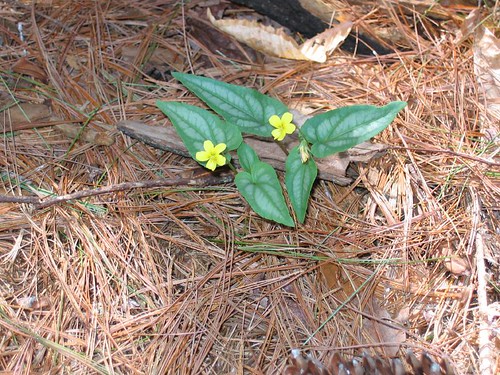
Viola, Red River Gorge, Kentucky.
(*photo credit)
April 24, 2024 Agonizing over a Wounded Earth
And sadness came over him and great distress. (Matthew 26:37b)
In the Garden of Gethsemane before his passion and death, Jesus agonized over our misdeeds and selfishness. This "agony" or deep mental and physical pain is so intense that he sweats blood, which doctors tell us could occur in such extraordinary circumstances. And this occurs in a garden, an Eden-like place, a place where human activity can make such an intense difference in healing our Earth. Jesus now becomes involved in the planet's healing process through sweat mingled with blood -- far more than Adam's sweat alone, for it is divinely given by Jesus Christ.
Our misdeeds cause social anguish that must be ultimately addressed. We may believe in forgiveness and that gives us peace, but yet the after-effects are still present as much as an afterglow of the Big Bang. Social implications of wrongdoing must be addressed not in lingering guilt but in responsible forthrightness. As responsible people, we are sensitive to current misdeeds of those close or far from us. These are more than private preserves of libertarians; these are the social effects of sin that must be addressed. Mental anguish over current deeds are not personal guilt so much as social justice issues. We must do something now for such actions hurt all on Earth -- and we accept responsibility. Jesus calls for human companionship to share his own pain -- moments of the deepest isolation ever experienced on Earth.
A deepening spirituality brings us to sense Earth's pain. Jesus says "Look what they have done to my Earth." As we become more deeply in tune with Earth and its rhythms, we enter into compassion through growing sensitivity. This anguish is not just over damage that is caused to Earth but over insensitivity of those who are greedy and callous, and their inability to refrain after repeated offenses. Compassion for Mother Earth opens us to being vulnerable through ridicule, disregard, or outright hostility. We enter into the mystery of Christ's agony; we suffer with Christ for what we as a people have done whether culprit or not.
Mother Earth is a sensate being capable of suffering pain; she is capable of sharing pain with sensitive children. Within an expanding community of shared pain we begin to see beauty marred by misdeed to plants and animals. Scriptures speak of Earth leaping with joy and crying in sorrow. It is more than poetic. We are spokespeople for Earth; its visible feelings are expressed through us who are sensitive and united to Earth's destiny. We are united with Christ and enter his agony now in our planetary garden. As Christ's Body, we experience Earth's anguish, for hers is ours; with a growing compassion we speak up for our Earth.
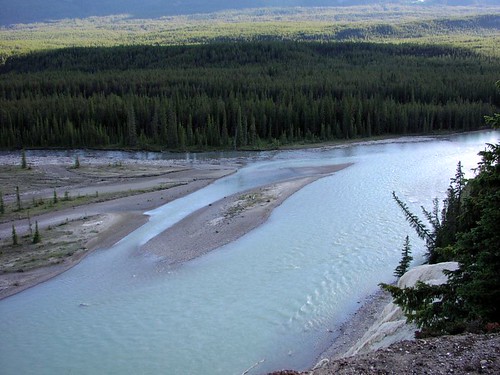
Scenic overlook near Athabasca, Canada.
(*photo credit)
April 25, 2024 Proclaiming Eco-Beatitudes
On this the Feast of St. Mark in many cultures there is a traditional blessing of the fields and flocks. In these more troubling times we must extend our blessing to include not only those who care for field and flock but also extend blessings to all who attend to Earth's plight, and to fellow workers who act as planetary caregivers as well:
Blessed are the gratefully poor in Spirit; God will show them the many ways to be truly thankful for all good gifts and to refrain from seeking what they mistakenly think they deserve.
Blessed are those with an open heart to have compassion for the threatened plants and animals of our world; God will provide whatever it takes to give them protection.
Blessed are those who seek to use appropriate technology enlisting the community and environmentally benign practices; they will learn more easily what benefits all people with the least harm to our planet.
Blessed are those who publicly work to share what they have with the needy; they will find ways to reclaim the commons for all and not for the privileged few.
Blessed are those living a simple down-to-earth lifestyle; they will quickly learn how to spread their influence even within a restrictive materialistic culture.
Blessed are the peacemakers who choose to stay unarmed in a militaristic society; they will be protected and find security by trusting in God and using effective means.
Blessed are those who truly believe that the Poor will rise and take back for the commons what belongs there; they will be confirmed in their fidelity.
Blessed are those who bear the Good News by voice or electronic device; they will be inspired to speak with clarity and in such a fashion that their message is heard.
Blessed are those who attack corporate structures and endure what occurred to the prophets of old for giving the warning signs of impending climate change disaster; they will endure much but ultimately become successful.

Bernheim Arboretum and Research Forest, lovely magnolia blooms.
(*photo credit)
April 26, 2024 Reflecting on Qualities of a Good Shepherd
I am the Good Shepherd: the good shepherd is one
who lays down his life for his sheep. (John 10:11)
Jesus is devoted to all, faithful to all, willing to sacrifice for all, and in doing so is humble or "down to Earth." He is an exemplar par excellence willing to find joy being with those entrusted to him. His own know him and thus are attracted to him as a friend, companion, and defender. He reveals to those that are lost the compassion shown by the Samaritan traveler on the road from Jerusalem to Jericho (Luke 10:33). He defends them at all costs, even to the point of his own life. His vision extends to the entire flock and not to a particular group exclusive of others and thus he expresses a universal charity to all. He is sensitive and leads up ahead, not driving his flock from behind.
Amazingly, the qualities shown by Jesus the Good Shepherd refers primarily to the animals in his flock to which the same could be said of human beings. Jesus is the perfect ecologist and this characteristic helps manifest this quality that extends to the animal and human world. Knowing his charges is important for successful livestock carers whether veterinarians, cattlemen, herders, or animal shelter managers. These know when their charges are sick and in need of a more nutritious diet; they understand their animals. Those who care for plant life (gardeners, foresters, and farmers) all bear the same kinship; some speak to plants like they do to animals and are known to have a green thumb.
What both animal and plant caregivers teach us is our basic role in being like Jesus in extending our compassion and service to all creatures, even the flora and fauna of this Earth. To have "dominion" means being responsible and caring when this is needed. This involves avoiding being a tyrant, a lording master demanding deference; rather it is similar to the service Jesus teaches us in washing the feet of the apostles. We are to be suffering servants; we need loving hearts, protecting hands, and heads bent on halting aggression done to harmed plants, animals, and fellow human beings. Jesus shows concern by serving us; we abandon our prideful privileges and opt to serve the needy.
Jesus empties himself (Kenosis) for us. Good Friday and the Calvary events in our lives are mercifully short-lived so that the eternal Easter we now enjoy may be more perfect. In other words, Jesus goes "out of his way" for us; he suffers and dies for us, rises and takes the title of Lord to the greater glory of God the Father. His emptying of himself becomes an opportunity for future glory. We, as other christs, are invited into this mystery of emptying ourselves for others including all living creatures. We freely follow in imitation of his shepherd qualities.
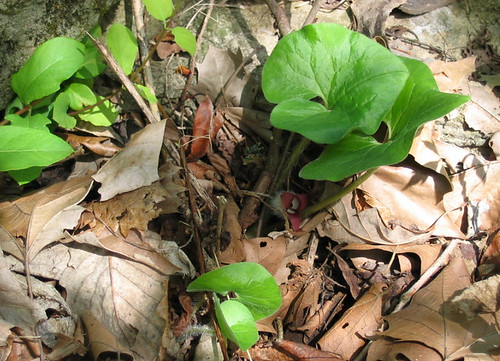
Asarum canadense, wild ginger.
(*photo credit)
April 27, 2024 Searching for Reasons to Help Remove Litter
Jane Blewett, a social justice activist, told me she would take a small garbage bag along on her daily walks and pick up a few pieces of litter each time. At that time I could not fathom why that should be done; she was not the one who littered. Only later in life have I started to pick up a few littered items at the end of daily outings. Really, I now clean up our Earth at my doorstep, regardless of who was so thoughtless as to litter it.
To clean up a disordered environment is to bring new life -- and cleaning is an unpleasant sacrifice that has benefits to us and community. However, should we help address a polluters' misdeeds? Why not leave it to those committed to community service as part of their rehabilitation to society? Why not direct our actions to making the polluter pay or the offender pick up the mess caused by thoughtlessness? There are several reasons why individual cleanup is necessary for those seeking to be Earthhealers:
a) We fight an institutionalized approach. This is one way to keep from becoming institutionalized and see only the "other" as having the responsibility to recruit a cleaning person whether it be the culprit, those employed by the culprit, the imprisoned or community service workers, or others who are employed by the government or private landholder to do the cleaning.
b) We feel better. It is important that at the end of the day we have contributed in some way to improving the environment.
c) We receive a crash environmental education. Waste and disorder is a condition arising within an irresponsible society: individuals litter; institutions create disposable items that become litter; and governments accept corporate profiteers who invent disposables. We tolerate litter and profiteers who pretend that individuals will dispose of discarded materials responsibly. Shirking responsibility for returnables is costly. Civic order involves carrots (enticements) and sticks (requirements).
d) We learn to deal with emergency measures. Beginning to improve the world makes us elementary healers who volunteer in Earth's emergency wards. We become sensitive to local disorderly practices and are quicker to respond; we discover urgency in dealing with deeper environmental problems when they arise; we overcome initial resentment and learn to act patiently.
e) We experience the humbling task of Earthhealing at a concrete level. As Down-to-Earth people we look down, see litter, and know something needs to be done now. The disturbance remains unless we act. Our pick-up is an appreciated kindness to Earth.
f) We learn to cooperate with similar folks. An elementary cleanup program directed to a forest, lake, river bank, or roadside introduces us to volunteers who form a solidarity bond.
g) We become a good example for others to follow. The cleanup motivates others to do the same; hope springs eternal.
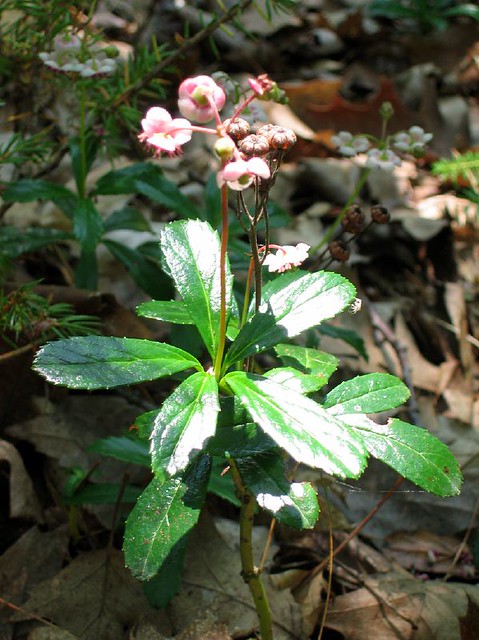
Chimaphila umbellata, pipsissiwa, near St. Ignace, MI.
(*photo credit)
April 28, 2024 Imitating Christ in Compassionate Suffering
But God raised him high and gave him a name which is above all other names so that all beings in the heavens, on earth and in the underworld, shall bend the knee at the name of Jesus and that every tongue shall acclaim Jesus Christ as Lord, to the glory of God the Father.
(Philippians 2:6-11)
One person who touches my Gallic heart is the maiden of Orleans, Joan d'Arc, who was called, responded, and led her people in a time of crisis. And then this humble illiterate teenager (19 at death) was seized, and forced to stand trial -- for which she had no legal defense. She was condemned on trumped-up charges to die on May 30, 1431, in the marketplace in Rouen before a company of English soldiers (not another woman present). As the flames leaped up around her, Joan kept her gaze on the crucifix and cried out, "Jesu, Jesu." They tell us each soldier remembered her last words until the day of his death.
Sufferers are powerful people when acting among a community of co-sufferers in the Body of Christ. These sufferers take on each of the special roles that Jesus performs in his passion and death:
* in a priestly fashion, sufferers present their lives as an offering back to God, and the more gracious is their love, the greater the quality of the offering;
* in agony, they see their sufferings as not isolated but conjoined with those of Jesus in the Garden, as well as with threatened and endangered creatures of Earth;
* as solitary witnesses, they stand apart from a world that finds little or no value in what they are enduring. That world scoffs in disbelief at their meaningful offering to God;
* in carrying their respective crosses, all believing sufferers do so gladly and with dignity; we must all see that our falls are part of a burden calling out for others to assist us; and
* in their final total sacrifice when they feel the power ebbing from their bodies, they offer all with the good Lord, sacrificing the fullness of returning all to God.
We invite all sufferers to enter into the suffering of Jesus and become bearers of Good News through the united power of their suffering. If they truly believe, the Spirit moves through them, empowering their every breath. The cross has spiritual power and with at-one-ment they fill what is wanting in Jesus' suffering. That redemption is now touching them to become models of the power Jesus shows. Willing sufferers are a manifestation of Calvary extending in space and time. Through the risen Jesus' power their suffering takes on a new dimension and they help bring healing to a troubled world. Rather than living a poorer quality of life, in the paradox of the cross sufferers become people living the highest human calling: they become primary agents of change.
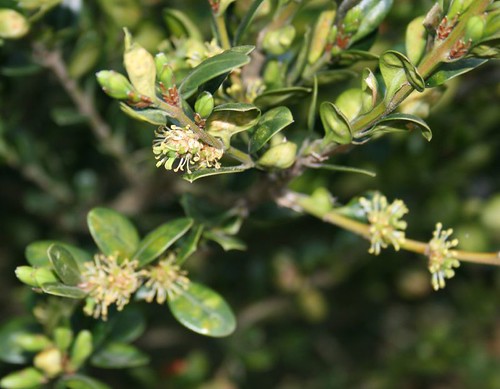
Boxwood shrub with spring flowers.
(*photo credit)
April 29, 2024 Inviting Sufferers into a Healing Community
Mary Ann told me that her husband's case seemed hopeless. He could not feed himself and she gave him almost constant nursing care, day and night. He was saying aloud "What is the use? There is no hope." We talked about how she could spread the Good News to him that he is quite powerful in his helplessness; he can bring others to Christ when entering completely into God's noble calling to those who suffer. A while later we met and she said he passed on to God but seemed to be more resigned and at peace when offering the sufferings in union with Jesus. Just retelling this is part of the blessing her suffering husband has bestowed on us.
Our eco-spirituality involves restoration of what has been hurt by human misdeeds. We start but do not end at the local grassroots level. The Cross, that sign of contradiction, (I Corinthians 1:22-25) overshadows our actions. It is positioned at the top of churches, wayside shrines, inside hospital rooms, and it overshadows all suffering people and the wounded Earth herself. While others may appear uncomfortable, believers glory in this cross; it inspires us not to flee from the suffering around us; it invites us to join more actively with those who suffer passively. We stand as upright beams planted in Earth. The cross beams embrace all and the upright one points to the meeting of God and Earth in the person of the crucified Jesus.
We strive to link ourselves to those who suffer in so many ways: they lack proper health treatment, have insufficient abilities for full employment, linger in prisons and hospitals, or cannot obtain affordable housing; they include the handicapped, threatened and endangered, overlooked, or belittled as of little or no worth. A ploy of the current economic System is to make Appalachia a sacrifice zone for profiteers in extractive industries. Believers must act; we cannot remain in splendid isolation, for solidarity is a hallmark of our faith. The critical question is not "Must I help?" but rather "What must I do to help be effective?" "Does a community exist in which we are to work?"
Joining forces seems to imply mobilizing active caregivers. Rather, we could mobilize sufferers who know suffering, who feel their own powerlessness, and who realize that power comes through and with another beyond our individual selves. Often these sufferers feel isolated, tempted to look inward to their own condition, and to fester in their seemingly hopeless condition. Their drive to self-preservation can hardly be faulted. However, we can give a special invitation to enter into the suffering of Christ now extended in space and time. The cross stands as a crucifix on which sufferers are nailed with Christ. It is not an empty instrument, an Easter Cross, but rather a crucifix.
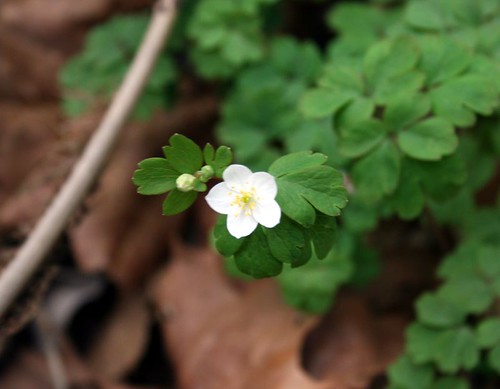
False rue anemone, Enemion biternatum. Franklin Co., KY.
(*photo credit)
April 30, 2024 Promoting the Conservation of Spiritual Energy
Be compassionate as your heavenly Father is compassionate. Do not judge, and you will not be judged yourselves; do not condemn, and you will not be condemned yourself; grant pardon, and you will be pardoned. Give, and there will be gifts for you; a full measure, pressed down, shaken together, and running over, will be poured into your lap; because the amount you measure out is the amount you will be given back. (Luke 6: 36-38)
A merciful and loving God would never allow suffering to disappear without leaving its mark of benefit, for every expenditure of energy leaves an effect. It is as though spiritual energy has a counter weight to any disorder in the universe; it adds to the order of the New Heaven and New Earth. To suffer in this world is to undergo change, and this in God's love and mercy is ultimately for the better. All good things return, like spring rain to the Divine Majesty. We Christians have the sure belief not only in life after death, but also in the mercy and compassion of God, a characteristic that is part of our authentic eco-spirituality. The challenge for us is to transform the "happy faults" (misdeed's) that have plagued our Earth into a restoration of Earth -- and thus part of the redemptive mystery of Christ the Resurrected One.
A Law of the Conservation of Spiritual Energy indicates that for God, who is all merciful, no planetary suffering is lost. If something on this Earth is lost at all, it is our opportunity to enter into the suffering community, to become godlier through our loving activities. And what are our lost opportunities? They are the overlooked happenings that could have been loving deeds, especially when we could have been compassionate in the midst of suffering, whether our own or our neighbor's. The quality of life of the sufferer united to God's will is meant to be so magnetic that they draw us to solidarity with the sufferer. If we are insensitive through affluence and selfishness, we miss feeding the hungry and clothing the naked.
On the other hand, if we are willing to participate in the event of the suffering ones we do a salutary act. This can hasten (accelerate) the movement to the Coming of the Lord and the New Heaven and New Earth. Failure to participate delays the Lord's coming. When we accept our proper role as caring people out of love for neighbor, we obtain compassion's reward (Luke Quote above). "Planetary suffering" stands in contrast to the pains to come, for hell is the eternal litany of lost opportunities. We enter a conservation era through participation in good deeds.
"Spiritual energy" has a quantitative aspect when it applies to us, its limited recipients and dispensers. We may lose benefits through free choices of denial, excuse, or escape, or gain them by union with Divine Compassion. When we become more compassionate towards those who suffer, we certainly expend physical energy that follows the traditional laws of thermodynamics. Furthermore, social workers are counseled to conserve their psychic energy, not to become too involved with their clients, or this involvement will hurt other portions of their enormous caseload. They must pace themselves -- and that is good advice, for all limited caregivers.
"Conservation" signifies a compassionate God who never allows the willing efforts of sufferers to be lost. We are tempted to compare this with the First Law of Thermodynamics but should not be too taken up with such matching; to say no suffering is lost, though its organizational effectiveness may be reduced by our lack of participation in the richness of obedient and learned suffering. Here also the temptation to regard this as analogous to the Second Law of Thermodynamics (entropy) should not be followed. Note: This is not also intended to be comparable to Teilhard de Chardin's two types of energy (radial and tangential), though there may be more similarities than with the laws of thermodynamics. This entire treatment calls for more development, and that depends on whether God gives us enough time to expand on that matter.
